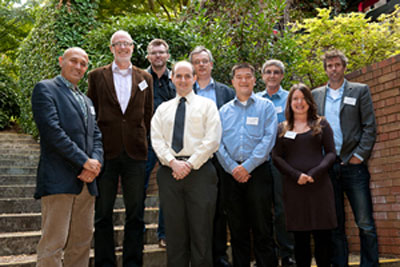| Dec 03, 2012 |
Biologists and physicists collaborate to investigate 'quantum biology'
|
|
(Nanowerk News) Renowned as one of science's strangest areas, where particles behave in extraordinary, counter-intuitive ways (Physicist Niels Bohr said: "Anyone who is not shocked by quantum theory does not understand it."), quantum effects are inspiring the emerging field of quantum biology and could lead to exciting discoveries in different areas of biology.
|
 |
| Prof Jim Al-Khalili (University of Surrey), Prof Johnjoe McFadden (University of Surrey, Prof Vlatko Vedral (University of Oxford), Prof Greg Engel (University of Chicago), Prof Nigel Scrutton (University of Manchester), Prof Thorsten Ritz (UC Irvine, USA), Dr Paul Davies (Arizona State University), Dr Jennifer Brookes (Harvard University), Prof Greg Scholes (University of Toronto).
|
|
Professor Johnjoe McFadden, from the University of Surrey's microbial biology department, who co-hosted a September workshop on quantum biology at the university, said: "Life is the most bizarre phenomenon in the whole universe and it's always struck me that it's difficult to account for by classical models, and that's what attracted me to thinking about quantum biology.
|
|
"Most biologists are familiar with thermodynamics but they know very little about the theory that blew classical physics away - quantum mechanics."
|
|
Evidence has emerged suggesting that plants use a form of quantum computing to calculate how best to direct energy through their photosynthetic apparatus - possibly exploring numerous pathways simultaneously and choosing the most efficient.
|
|
Scientists have also discovered that some birds appear to use quantum entanglement to sense the earth's magnetic field, helping to explain how they can migrate long distances using the field.
|
|
There is also good evidence that enzymes use a process known as quantum tunnelling to catalyse chemical reactions, allowing particles to pass through barriers at hugely accelerated rates.
|
|
Although normally observed in precise, carefully controlled laboratory conditions at extremely low temperatures, it seems that quantum effects in the in the warm and wet biological world are real, and researchers are attempting to find out why and what it means for the natural world.
|
|
The workshop, called "Quantum Biology: Current Status and Opportunities" was sponsored by the BBSRC, the Institute of Advanced Studies and the MILES programme at Surrey University and gave international researchers who have made landmark advances in the fledgling field a chance to share knowledge.
|
|
Speaking alongside fellow organiser Professor McFadden, Jim Al-Khalili, professor of physics at Surrey University, said: "To say we want to look for these sort of mechanisms and phenomena in biology you might imagine is one step too far, after all many physicists asked about whether the weirder aspects of quantum mechanics play a role in biology will say 'well clearly not'. There's that same well-rehearsed argument that biological systems are warm, wet, messy, complex, there's no way that they can maintain this delicate quantum coherence.
|
|
"It's amazing to think that experimental biology is now at a stage where we can probe whether those sorts of weirder aspects of quantum mechanics are important.
|
|
"It's still a new field but the fact is biologists are now able to carry out such sophisticated experiments that quantum physicists really do believe they can actually test some of their ideas."
|
|
At the moment the field is tiny, with perhaps just a few dozen scientists around the world working on it, but it is expected to grow in the coming years
|
|
Co-organiser Vlatko Vedral, professor of physics at the University of Oxford, said: "We think that entanglement is a really fragile phenomenon and it involves only a small number of particles and it's very difficult to generate and manipulate and so on.
|
|
"But then at some stage I think this story changed significantly? and I realised that in fact it shouldn't be that difficult to witness the presence of entanglement in macroscopic objects.
|
|
"Given that biology is nothing but an application of the laws of chemistry and given that chemistry is nothing but quantum physics really, then biology should actually find instances where entanglement and quantum coherence plays a role."
|

